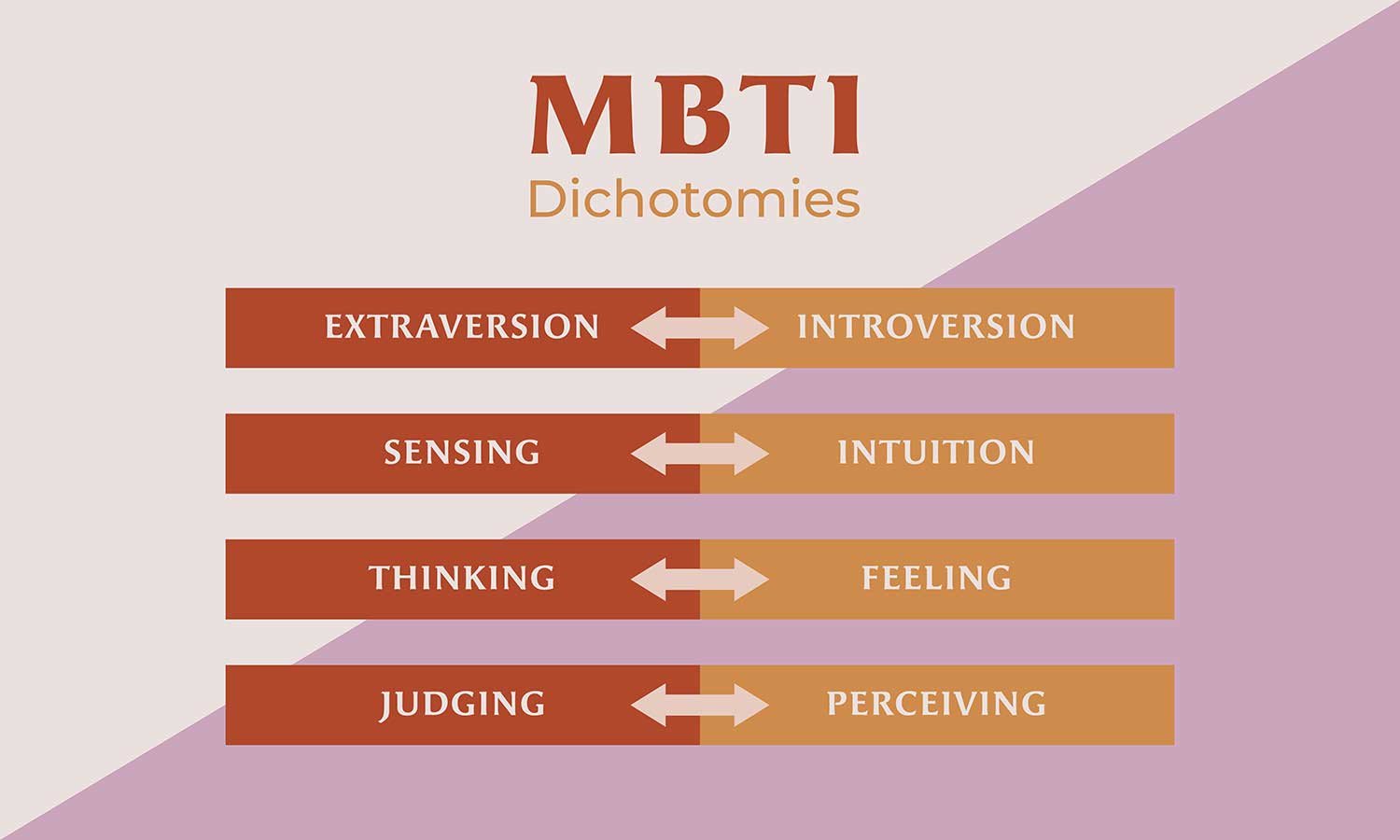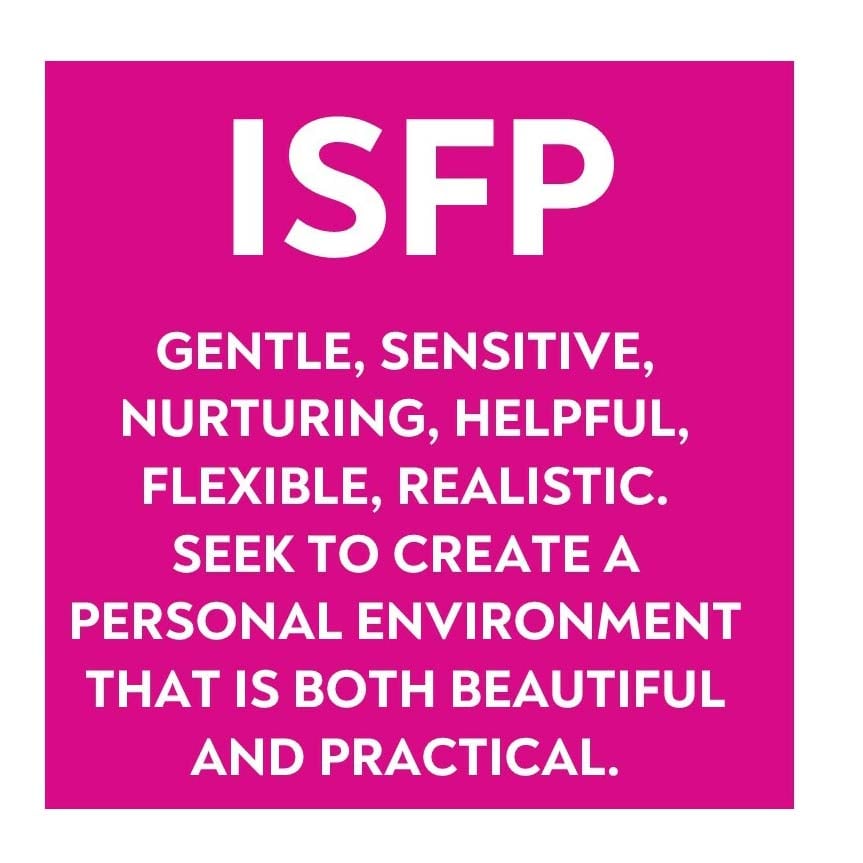ISFP, as defined by the Myers-Briggs Type Indicator (MBTI), stands for Introversion, Sensing, Feeling, and Perceiving. ISFPs are quiet, sensitive, and flexible, often characterized by their appreciation for beauty, practical skills, kindness, and a strong desire to live in harmony with their environment.
ISFP Meaning
ISFPs find rejuvenation in solitude (Introversion), lean towards tangible experiences and present realities over abstract possibilities (Sensing), base decisions on personal values and emotional implications rather than logical analysis (Feeling), and value adaptability and live-in-the-moment experiences over strict plans (Perceiving).
People with this personality type tend to be peaceful, easy-going, and down-to-earth individuals.
They have a strong need for personal space and value time alone to recharge. They appreciate deep connections and enjoy spending time with their small circle of close friends and family.
They are highly considerate and accepting, committed to their values and to the people who are important to them.
ISFPs are sometimes referred to as “the Artist,” “the Composer,” or “the Adventurer.” ISFP is the opposite personality type of ENTJ.
ISFP is the fourth most common type in the population. ISFPs make up:
- 9% of the general population
- 8% of men
- 10% of women
Famous ISFPs include Rihanna, Cher, Michael Jackson, Marilyn Monroe, David Beckham, and Harry Potter.
| Strengths | Weaknesses |
|---|---|
| Passionate | Reserved and quiet |
| Open-minded | Unpredictable |
| Charming | Overly sensitive |
| Creative | Strong need for personal space |
ISFP Characteristics
ISFPs are true optimists
- They have a unique ability to find joy in each day and embrace an easygoing and carefree lifestyle.
- They like to live in the present moment, welcoming spontaneity and adventure.ISFPs are open-minded, free-spirited individuals who enjoy and appreciate all that life has to offer.
ISFPs are pragmatic
- They like to keep their options open so that they can make the most rational decisions before committing to something.
- They spend their time immersed in the present moment and are thus very aware of their surrounding environment.
- ISFPs dislike abstract theories and prefer learning situations that focus on practical information and hands-on experience.
ISFPs are loyal not only to their values and beliefs, but also to their friends and family
- They have big hearts and are highly accepting of others, looking for ways to be accommodating and establish harmony.
- They enjoy helping others and are carefully observant of the needs of the people around them.
ISFPs are introverts at heart
- They are friendly and loving individuals who enjoy the company of their closest friends and family, but they require time alone to recharge their energy after socializing with others.
- They can be quiet and reserved, but their charming attitude makes them highly likable and popular.
ISFPs are creative
- They have a vast array of passions and interests and are always interested in exploring new ideas. They have vivid imaginations, strong aesthetic sensibilities, and curious spirits, eager to find the beauty in their surroundings.
- When ISFPs are referred to as “the Artist,” this does not necessarily mean in the conventional sense (although many ISFPs do have a natural talent for the arts).
- They are referred to as “the Artist” because they treat life as a canvas for self-expression, acting in ways that reflect their own unique traits and creative talents.
Cognitive Functions
The MBTI suggests that the four different cognitive functions (thinking, feeling, intuition, and sensing) form a hierarchy where each function is either directed outwardly (extroverted) or inwardly (introverted). The order of these functions determines one’s personality.

The dominant function is the primary aspect of personality, while the auxiliary and tertiary functions play supportive roles.
Dominant: Introverted Feeling
- ISFPs have their own system of values and beliefs that drive their judgments and decisions.
- They approach experiences based upon how they feel about them in the moment and are more interested in personal concerns than objective information.
Auxiliary: Extraverted Sensing
- People with the ISFP personality type are well attuned to their surroundings and have a strong sense of their immediate environment.
- They stay focused on the present moment, taking in new information and noticing the sights, smells, and sounds around them.
Tertiary: Introverted Intuition
- This function of the ISFP personality tends to operate in accordance with their extraverted sensing function.
- As ISFPs take in information from their surroundings, they can develop “gut feelings,” prompting them to experience epiphanies or revelations about themselves or others.
Inferior: Extraverted Thinking
- Organization and planning is the weakest element of the ISFP personality.
- This function is used in certain situations when ISFPs become focused on precise details and want to find the most effective way to do something or express an idea.
ISFP Hobbies, Interests, and Careers
ISFPs enjoy the outdoors, seeking out jobs or hobbies that put them in contact with animals and nature. They are attuned to their physical surroundings, so it is important that they work in an environment that is authentically pleasing.
They enjoy being able to create tangible results so they can observe their efforts and appreciate the fruits of their labor. Because of this, ISFPs often make great gardeners, botanists, or foresters.
ISFPs thrive in careers that are engaging and hands-on, offering personal freedom and autonomy. They make great artists, cosmetologists, musicians, designers, chefs, and photographers, as ISFPs often use work as an outlet to express themselves artistically.
Other popular careers for ISFPs include teachers, social workers, veterinarians, or nurses.
In their free time, ISFPs enjoy activities that allow them to utilize their physical or artistic skills, such as skiing, swimming, dancing, and crafting. ISFPs also enjoy entertaining in intimate groups and exploring art and nature.
ISFP Work Environments
ISFPs prefer harmonious, relaxed environments where they can have the personal freedom to express their creativity and do things their own way.
They do not like to be controlled or micromanaged so a strict environment where there are rules and regulations would not be suitable for an ISFP.
ISFPs are introverted, so they tend to prefer to work independently. But, when working with others, they get along best with colleagues who are flexible, easygoing, and supportive.
ISFPs are hard workers, but they work best in casual, steady environments as opposed to high-pressure, performance-led workplaces.
They have strong values, so it is important they work in an environment that reflects these. ISFPs prefer to work behind the scenes and keep a low profile, so they are typically not found in leadership or managerial roles.
ISFP Personal Relationships
Because ISFPs are introverted individuals, they tend to be reserved and quiet around new friends or people they do not know well. ISFPs are very private and often keep their true feelings to themselves, so they can be difficult to get to know.
They even sometimes will avoid sharing their thoughts and feelings with their romantic partners. But, ISFPs care deeply and can prove to be warm, caring, and loyal partners.
When they are with a partner or a friend they trust, they are able to relax and are more likely to open up. If ISFPs feel appreciated in a relationship, they will reciprocate in any way they can. They are easy-going and uncritical and are able to get along with just about anyone.
ISFPs take wholehearted enjoyment being in the company of their fondest friends, companions, and relatives. They are laid back and spontaneous and love spending time with their loved ones in fun, casual environments.
ISFPs are action-oriented, expressing their care and affection through simple gestures rather than discussing feelings. ISFPs avoid conflict or criticism and prefer harmonious, carfree interactions where they can go with the flow.
Tips for Interacting With ISFPs
Relationships
As a partner of an ISFP, it is important that you make an effort to understand them and ensure that their voice is heard. When accepted for who they are, ISFPs are more likely to reveal themselves.
ISFPs value actions over words so take the time to show gestures of affection and to appreciate the ISFP’s considerate nature.
ISFPs are vulnerable to criticism so it is necessary to provide them with positive affirmations and emotional support.
Friendships
ISFPs need to build trust with new friends before they can open up and feel natural. You can make ISFPs feel comfortable by supporting and accepting them for who they are.
ISFPs also value their personal space and freedom so it is also important to recognize and respect this aspect of their personality.
Parenting
As parents, ISFPs are warm, devoted, and affectionate. They take joy in providing for their children and creating comforting, stable home environments. They are attentive to their children’s practical needs and are dedicated to the care of their loved ones.
They emphasize quality time with their families and value these intimate familial connections.
ISFPs are one of the most relaxed personality types, giving their children the freedom to explore and experience new things.
Take the MBTI (Paper Version)
Sources
King, S. P., & Mason, B. A. (2020). Myers‐Briggs Type Indicator. The Wiley Encyclopedia of Personality and Individual Differences: Measurement and Assessment, 315-319.
Myers, I. B. (1962). The Myers-Briggs Type Indicator: Manual (1962).
Myers, K. D., & Kirby, L. D. (2015). Introduction to type: A guide to understanding your results on the MBTI assessment. Sunnyvale, CA: CPP.
Myers-Briggs Type Indicator. (2019, May 28). New World Encyclopedia, Retrieved from https://www.newworldencyclopedia.org/p/index.php?title=Myers-Briggs_Type_Indicator&oldid=1020015.
Myers, Isabel B.; Myers, Peter B. (1995) [1980]. Gifts Differing: Understanding Personality Type. Mountain View, CA: Davies-Black Publishing. ISBN 978-0-89106-074-1.
Pittenger, D. J. (2005). Cautionary Comments Regarding the Myers-Briggs Type Indicator. Consulting Psychology Journal: Practice and Research, 57(3), 210-221.
The purpose of the Myers-Briggs Type Indicator®. The Myers & Briggs Foundation: MBTI Basics. (n.d.). Retrieved from https://www.myersbriggs.org/my-mbti-personality-type/mbti-basics/



